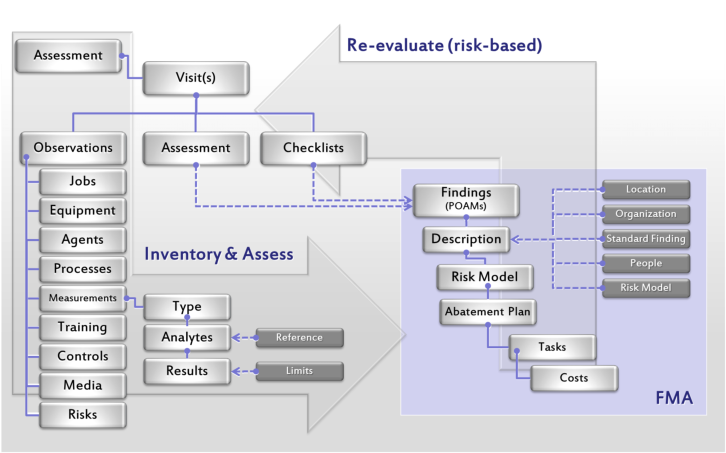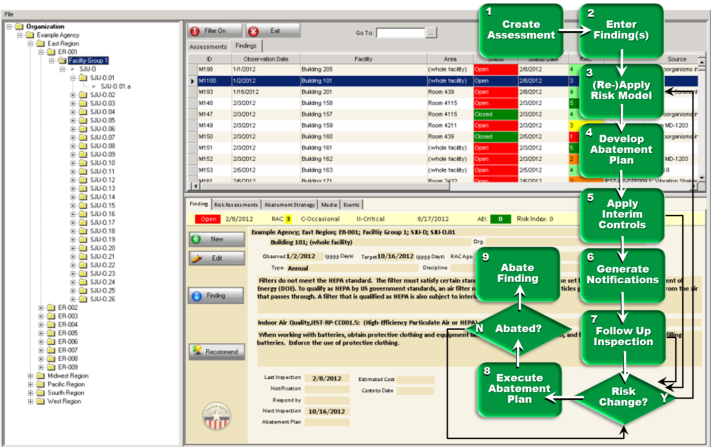
Cloud
Application
Hosting

Contact
Us

Cloud
Application
Hosting

Application
Development

Mobile
Applications

Data
Interfaces

Enterprise Data
Visualization &
Analysis

Incident
Management
Risk
Assessment

Risk
Management
Suite
The Zoldak Group



Workers
Compensation
Process Risk
Management


Risk Management Technologies
Developed by ZGi
© 2014 The Zoldak Group, Inc.
RMS Risk Assessment Modules (FMA and RMA)









ZGi has developed two risk management products: Facility Management Assistant (FMA) and Risk
Management Assistant (RMA). The FMA is workgroup-oriented. The RMA extends the FMA application
with additional features. Either product is scalable from workgroup to enterprise level. The FMA and
RMA share a common focus:
1.
Systematic risk identification, characterization, and management through inspections and audits.
2.
Integrated, multi-disciplinary incident analysis, management including injuries, near misses, property
damage, motor vehicle incidents, and any other incident that has affected mission including root
cause analysis and corrective action / countermeasure development and tracking.
3.
Continuous improvement by implementing short-term risk reduction strategies, continual risk
monitoring for control efficacy, implementing a final abatement plan, continual surveillance to
evaluate final risk-reduction and follow up surveillance to note recurrence or other root causes.
Facility Management Assistant (FMA)
The FMA supports systematically characterizing, and controlling a wide range of risks identified
inspections and audits. The FMA was first implemented in the intelligence community in 1994 and has
earned acclaim as a comprehensive, flexible, analytical tool by a range of agencies and the private sector.
Saves Time: It is proven to significantly reduce the amount of time to document inspections. Users
estimate between 80 and 300% decrease in the inspection cycle time. Because FMA guides users though
the documentation process, inspection results are consistent and accurate. A risk wizard is used to
calculate risks (DoDI 6055.1, CARVER, Environmental, etc.).
One Product, Many Uses: Although the FMA Workgroup module is used by one or more members of a
department (e.g., safety, industrial hygiene, or fire protection), its benefits are even more dramatic when
used to integrate sister risk management organizations. This provides management with a more
complete, integrated view of risk arising from multiple sources and reduces redundancy. FMA is scalable
and is currently used in an enterprise model integrating many work groups.
Comprehensive: FMA is used to manage a wide range of facility/infrastructure, behavioral, tactical issues
supporting: safety, environmental, occupational health, radiation safety, explosives safety, anti-terrorism,
force protection, facilities conditions assessments, as-built inspections, program audits, etc.
Risk-Based Decision Support: Findings are risk ranked using Risk Assessment Codes (RAC) calculated via
wizards based on probability and severity of an adverse consequence. RACs are used to prioritize follow-
up activities so that the findings with the highest risk potential are resolved before those of lower risk
potential.
Integrates with Other Systems: FMA interfaces with other systems such as work order, geographic
information systems (GIS), email, etc. This provides greater efficiency and consistency. For example,
when linked to a work order system, FMA will use the same standard facility locations and provide
information that can be used to generate work orders automatically without entering the data again.
FMA data can populate various layers of a GIS providing not only locations of problems but risk potential,
status, and interaction with other infrastructure components.
Sophisticated Graphic Analyses: The analysis module provides over 80 standard text-base and graphical
report covering nearly any reporting requirement from generating a notification / posting package to
sophisticated trend analyses. All reports are exportable to a wide range tools (e.g., Excel, PowerPoint) for
just in time analysis and briefing.
Risk Management Assistant (RMA)
The RMA is a comprehensive, enterprise-oriented risk management system extends FMA functionality by
incorporating prospective risk assessment observation detail. The RMA collects, maintains, and analyzes
a wide range of infrastructure and operational conditions resulting a complete risk potential profile
related to tasks, processes, agent use, environmental conditions, etc. This is provides distributed
organizations the ability to inventory risk and make risk management decisions based on consistent data
which is rolled up by location and organization.
Collaborative, Multi-disciplinary Capability: The RMA integrates a range of inspection, conditions
assessment, and audit functions into a single software product and methodology. The RMA supports an
assessment conducted by a multi-disciplinary team and provides a complete inventory of conditions,
hazards, and other infrastructure and behavioral characteristics. RMA supports risk assessment and
management functions of a range disciplines including safety, environmental, fire protection, radiation,
facility management, industrial hygiene, engineering, architecture, explosives safety, security, critical
infrastructure and more. It supports complex and specific audit and inspection requirements for OSHA,
DoD, NFPA, JSIVA, JCAHO, ISO, FDA, OSHA, EPA, systems safety, MIL-STD-882 D, conditions assessment,
critical infrastructure, and more. This approach supports an All-Hazard approach by integrating and
addressing a range of risks.
Reduces Time From Observation to Decision: The quality enterprise risk decisions are directly related to
timeliness and accuracy of data. RMA shortens lag time from observation to decision because inspections
and audit data are collected and validated at the organizational level. These data are aggregated at any
level above that reducing data calls. RMA enforces consistency though the use of a range of data
validation and collection methods.
Below is a summary of the types of data and their relationships managed and analyzed in RMA:
























